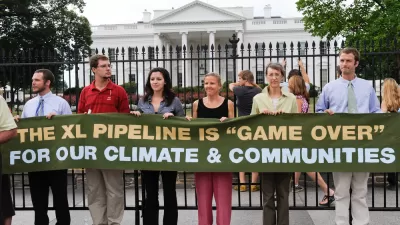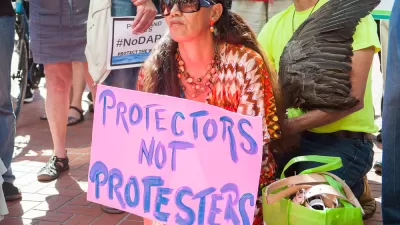President Biden's executive order may put the final nail in the coffin of the controversial pipeline project, but it was unwavering local activists who kept the pressure on for a decade.

The Keystone XL pipeline, which, along with the Dakota Access Pipeline, became a buzzword and a political lightning rod during the Trump administration, may finally be dead thanks to an executive order signed by President Biden rescinding a prior permit. But, according to Yessenia Funes writing for Atmos, it is the frontline Indigenous organizers, working tirelessly for the last ten years to stop the project, that deserve the real credit.
Since 2011, Joye Braun has been a key part of the fight against the pipeline. In the beginning, residents like her primarily worried about protecting important waterways and sacred lands. Since then, climate change and greenhouse gas emissions have become urgent global concerns. "Braun has seen former President Barack Obama (with Biden alongside him) kill the 1,179-mile pipeline only to see Trump resurrect it. That’s why she calls it a 'zombie pipeline.'"
Activists are cautiously optimistic that Biden's action will stop the pipeline for good. "Tribal nations in the U.S. are sovereign nations with treaty rights. All they ask is that the federal government and private companies treat them as such and leave their water and lands alone."
FULL STORY: RIP Keystone XL

Trump Administration Could Effectively End Housing Voucher Program
Federal officials are eyeing major cuts to the Section 8 program that helps millions of low-income households pay rent.

Planetizen Federal Action Tracker
A weekly monitor of how Trump’s orders and actions are impacting planners and planning in America.

Ken Jennings Launches Transit Web Series
The Jeopardy champ wants you to ride public transit.

Rebuilding Smarter: How LA County Is Guiding Fire-Ravaged Communities Toward Resilience
Los Angeles County is leading a coordinated effort to help fire-impacted communities rebuild with resilience by providing recovery resources, promoting fire-wise design, and aligning reconstruction with broader sustainability and climate goals.

When Borders Blur: Regional Collaboration in Action
As regional challenges outgrow city boundaries, “When Borders Blur” explores how cross-jurisdictional collaboration can drive smarter, more resilient urban planning, sharing real-world lessons from thriving partnerships across North America.

Philadelphia Is Expanding its Network of Roundabouts
Roundabouts are widely shown to decrease traffic speed, reduce congestion, and improve efficiency.
Urban Design for Planners 1: Software Tools
This six-course series explores essential urban design concepts using open source software and equips planners with the tools they need to participate fully in the urban design process.
Planning for Universal Design
Learn the tools for implementing Universal Design in planning regulations.
Ada County Highway District
Clanton & Associates, Inc.
Jessamine County Fiscal Court
Institute for Housing and Urban Development Studies (IHS)
City of Grandview
Harvard GSD Executive Education
Toledo-Lucas County Plan Commissions
Salt Lake City
NYU Wagner Graduate School of Public Service





























